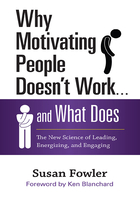
1. The Motivation Dilemma
Imagine you have the perfect person in mind to recruit and hire as a new employee. Your offer includes the highest salary ever offered to someone in this role. You are authorized to include whatever it takes to motivate this person to work in your organization—signing bonus, moving allowance, transportation, housing, performance bonuses, and a high-status office.
This was the situation facing Larry Lucchino in 2002. His mission: lure Billy Beane, the general manager of the small-market Oakland A's, to the Boston Red Sox, one of the most storied and prestigious franchises in baseball. Lucchino was impressed with Billy's innovative ideas about using sabermetrics—a new statistical analysis for recruiting and developing players.
The Red Sox offered Billy what was at the time the highest salary for a GM in baseball's history. The team enticed him with private jets and other amazing incentives. As you may know from Moneyball: The Art of Winning an Unfair Game by Michael Lewis or from the hit movie starring Brad Pitt, Billy turned down the historic offer.
In real life, Billy is almost a shoe-in for the Baseball Hall of Fame because of the choices he has made, the relative success of the low-payroll Oakland A's, and how he revolutionized the game of baseball through sabermetrics. He also provides an example of what you face as a leader. The Boston Red Sox could not motivate Billy Beane to be the team's general manager with a huge paycheck and extravagant perks.
Billy's mom, Maril Adrian, is one of my dearest friends. It was fascinating to hear her perspective as Billy's life unfolded in the media over the decade. Sports Illustrated corroborated her assertion that money didn't motivate Billy: “After high school, Beane signed with the New York Mets based solely on money, and later regretted it. That played into his decision this time.”
To understand Billy's choices is to appreciate the true nature of human motivation and why motivating people doesn't work. Billy was motivated. He was just motivated differently than one might expect. He was not motivated by money, fame, or notoriety but by his love of and dedication to his family and the game of baseball. Trying to motivate Billy didn't work because he was already motivated. People are always motivated. The question is not if a person is motivated but why.
The motivation dilemma is that leaders are being held accountable to do something they cannot do—motivate others.
I was sharing these ideas with a group of managers in China when a man yelled, “Shocking! This is shocking!” We all jumped. It was really out of the ordinary for someone in a typically quiet and reserved audience to yell something out. I asked him, “Why is this so shocking?” He replied, “My whole career, I have been told that my job as a manager is to motivate my people. I have been held accountable for motivating my people. Now you tell me I cannot do it.” “That's right,” I told him. “So how does that make you feel?” “Shocked!” he repeated, before adding, “and relieved.”
This led to a robust conversation and an epiphany for leaders and human resource managers in the room. They came to understand that their dependence on carrots and sticks to motivate people had become common practice because we didn't understand the true nature of human motivation. Now we do. Letting go of carrots and sticks was a challenge because managers did not have any alternatives. Now we do.